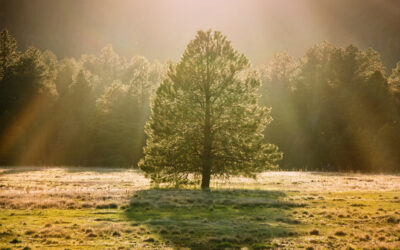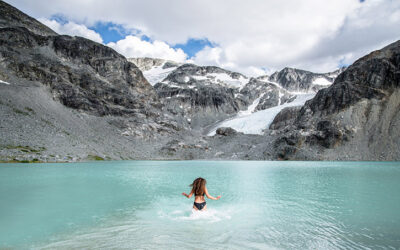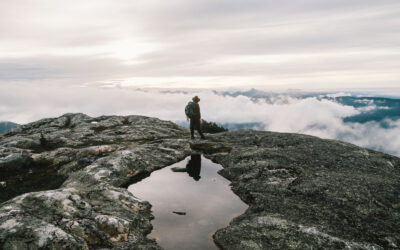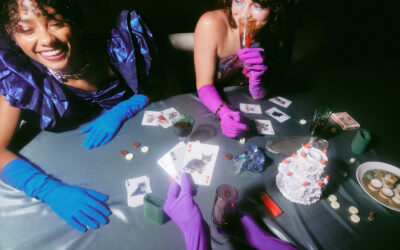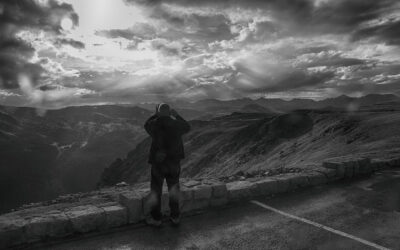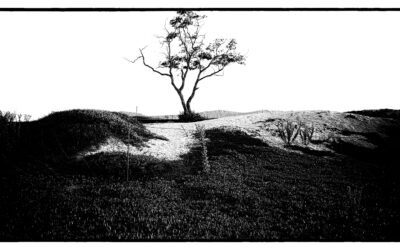HOW TO IMPROVE YOUR PHOTOGRAPHY 3700% IN ONE YEAR
I first heard of the 1% growth principle through James Altucher on one of his podcasts. I think it was the first time, although it seemed very familiar to me so I may have heard it somewhere else.
No matter. It made immediate sense to me although the idea of actually trying to measure 1% growth seemed a bit hard to pin down.
But I totally understand how it can work to build a better anything – especially when it comes to art and business.
And we are in the business of art.
After working on this concept for about two years, I realized that most of us had already figured it out, but we called it something else.
Practice.
I learned to play the drums by taking sticks in hand and pounding on an old set of Slingerlands.
I learned to play a few tunes on the piano by sitting there and screwing up far more than I didn’t.
I learned to be a photographer by working at it constantly and consistently until I had what I was working on down.
In all cases, I sucked at first.
I am not the world’s best drummer, but I am a lot better than I was when I started.
I am not the world’s best pianist, but I am a hell of a lot better than when I started.
I am not the world’s best photographer, but I am constantly trying to get better than I was last year.
We all suck at first. We all must put in the practice we need to improve.
I hear people say “I can’t paint” when they have never tried, never sucked, and never gotten better.
“I can’t write” is not a reality if you have never tried.
“I suck at portraits” is very weak if you have only done a couple of dozen.
You see, no one that we admired actually began at the level they are now.
They had to suck, then they had to adjust so they would suck less.
Sucking less should be the priority of every artist. Whether they are new, or old masters.
What makes something suck may be quite obvious when you are first getting started, and be much more subtle when you are an established master.
I have seen people far more accomplished than most require more and more of themselves so they suck less, even though they may be in the highest level of achievement.
The amazing Hilary Hahn has achieved enormous success as a violinist but has recently returned to basic training almost starting from the beginning to better her technique.
She created a challenge for herself and other violinists on her Instagram page: 100 Days of Practice. The response is amazing, check it out.
Many would say that Hahn doesn’t need to go back to scales and arpeggios, but she knows that if she can become just a little bit better at the basics – say, 1%, the compounded interest on that practice will pay off big time when she begins her next project.
Samuel Barber Violin Concerto, Movement Three, Presto. Hold on to your butts. (She plays from memory, too.)
Improving at 1% per day doesn’t end up making you 365% better at the end of the year. It ends up making you 37,000% better.
Because it is compounded each day.
Here is a graph by Chris Gardner that explains it pretty well.

Chris has a wonderful post on explaining the 1% Principle.
But let’s take a moment to look at how photographers can work the 1% principle into their own art and business.
I was thinking that a list of ideas would work here, but I had to rethink that because any ideas I came up with were specific to me, and may not help you with a specific improvement. Let’s try to fly a bit higher than that macro list thing.
Look at your work, really look at it.
Find something you need to work on. You probably already know what that is, but if you don’t that is a good place to start.
Then work on it each time you shoot.
If composition is a struggle, work on trying to find compositional elements and constructs that mean something to you. Stick with it. Arrange and re-arrange. Demand a photograph that comes closer to what you want to do before you pack it in.
If it is exposure, or understanding a light meter, or simply trying to have better lighting in your portraits, work on it as a singular item, and also as a part of your overall approach.
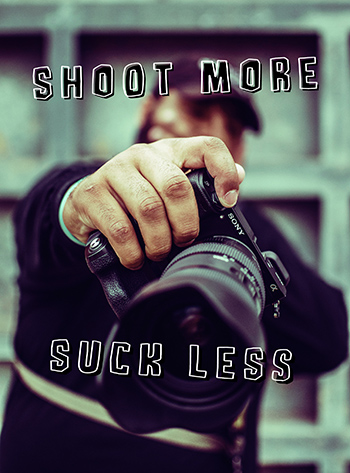 Read.
Read.
Watch videos.
Shoot.
Adjust.
Shoot.
Read.
Shoot.
Watch videos.
Shoot.
Adjust.
Simple.
And also difficult as hell for many of us too hooked on instant gratification, “easy buttons”, shortcuts, and hacks.
You can’t hack talent. You cannot hack vision. You cannot hack excellence.
Well, you can, really.
Shoot more. Suck less.
Not really a hack, more of a prescription to lots of work.
Do you dread making cold calls?
Make 10 tomorrow. Hell, make 12.
Call more. Suck less.
Are you uncomfortable using your Speedlight off-camera?
Grab it and spend the next 3 days and nights shooting with it in an umbrella. Photograph anyone and anything you see in front of you.
Morning, noon, and night.
Flash more. Suck less.
Is it a challenge to stay organized?
Organize one drawer tomorrow. Get it as perfect as possible.
Do a second one Wednesday. Make it even better.
Then a third.
Organize more. Suck less.
I understand the desire to just go out and do whatever we want without the skills we should have mastered before going out – but that will NEVER lead to mastery, only a mediocre plateau and the belief that we are better than we really are.
When you practice you notice things that sucked that you may not have even known sucked.
And each time you get a little better.
A little more confident.
A little more aware, more in tune, more “in the zone”.
Because when you shoot more, you simply will suck less.
See you next time.
Photo by Matthew Brodeur on Unsplash
14 TRAITS OF THE MOST SUCCESSFUL PHOTOGRAPHERS: SELINA MAITREYA
14 TRAITS OF THE MOST SUCCESSFUL PHOTOGRAPHERS SELINA MAITREYA AND DON GIANNATTIWe had a wonderful meeting with Selina Maitreya today. She gave us her list of qualities that all of the successful photographers she knows posess. They Show Up and : / Are talented /...
THESE SIX MINDSETS CAN DESTROY YOUR BUSINESS IN 5, 4, 3…
The 6 Worst Mindsets a Creative Photographer Can Have Regarding Their Art and Business Creativity and business might seem worlds apart for many photographers. After all, the pure artistic expression of photography is often thought to be free from the constraints of...
USP VS POV: WHICH IS BETTER?
How to find your USP or UPOV. Over at my Substack, we discussed the divide forming between those advocating USPs and POV (I refer to them as UPOVs) In a nutshell: POV vs. USP: The Power Players in Branding Let's take a whirlwind tour through the buzzing world of...
DISCOVERING YOUR PHOTOGRAPHIC STYLE BY LOOKING BACK
Discovering Your Photographic Style by Looking Back at Your Favorite Work Everyone, from budding photographers to professionals, seeks a distinctive style that sets their work apart. But how do you discover that unique touch? One powerful method is to look back at...
The Business Case for Expanding Creative Skills
The Business Case for Expanding Creative Skills We have a small reprieve from the infernal heat in Arizona as Hurricane Hillary makes landfall just southwest of us. We are dry, but under the deep overcast, the temps are milder than usual. Imagine being happy that it...
5 THOUGHTS ON CREATIVITY
Unveiling the Mysteries of Creativity: A Field Guide Hey, you wonderful, marvelous creatives and visionary photographers! Let's get into the delightful world of creativity. It’s a complex, fascinating process that involves our whole brain. So, let’s uncover some...

